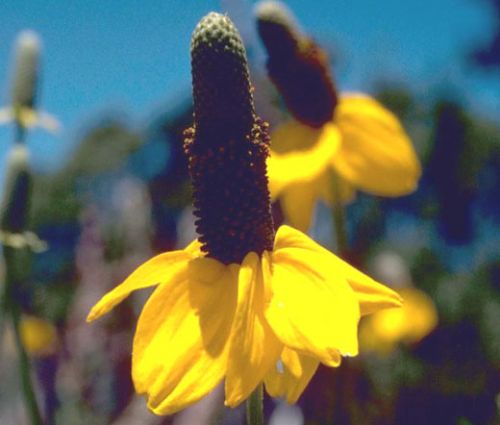Clasping Coneflower Rudbeckia Amplexicaulis is a half-hardy annual plant native to the southeastern United States. Very easily grown from seeds Clasping Coneflower has naturalized throughout most of North America. Rudbeckia Amplexicaulis features foliage with elongated, bluish, waxy leaves that generally clasp around the stem at the base. Clasping Coneflower produces flower heads that are similar to those of black-eyed susans, but are smaller, and the yellow outer "petals" droop as the flowers mature, and the cylindrical black center is elongated up to 2 inches in length. Clasping Coneflower blooms in summer and fall attracting butterflies, bees, and birds.
Clasping Coneflower is used mainly for landscape beautification, and this Coneflower has potential for use in cultivated garden situations, or in naturalized prairie and meadow plantings as well as along roadsides. Rudbeckia Amplexicaulis seeds germinate fast, and Coneflower plant prefers to grow in full sun tolerating partial shade and adapting to almost any soil types. Clasping Coneflower is often forms dense colonies in moist areas, and this annual is a very heavy re-seeder. Coneflower makes a good cut flower.
PLANT PROFILE
Season: Annual
Height: 24 Inches
Bloom Season: Summer/Fall
Environment: Sun/Partial Shade
Soil Type: Rich/Average/Poor/Moist well-drained, pH 5.8-6.8
USDA Zones: All Regions of North America
PLANTING INSTRUCTIONS
Sow Indoors: Winter
Sow Outdoors: Spring/Summer
Seed Depth: Surface sowing - press seeds slightly into the soil
Germination Time: 10-15 Days
No posts found

